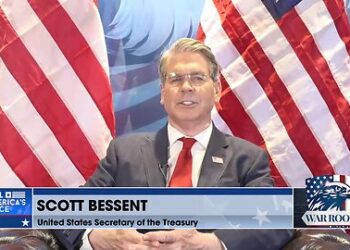Steve Bannon Advocates for an “External Revenue Service”
Steve Bannon is calling for a complete rethinking of how the United States funds its government. Speaking on January 13, 2025, Bannon emphasized the need to reduce the burden on American taxpayers by creating what he terms an External Revenue Service. This would shift financial responsibilities onto foreign entities benefiting from access to U.S. markets and resources.
Key Points:
Tariffs as Revenue
Bannon argues that tariffs should become a primary revenue source, as they were in the 19th century. He stated, "Why do foreign entities get a free pass to access the greatest, most robust market in the world?” He criticized the Internal Revenue Service (IRS) for putting the tax burden on American citizens, small businesses and workers.
Bannon proposed codifying tariffs as a long-term strategy to reduce reliance on personal income taxes. He cited past trade deficits with China, saying, "In November, the trade deficit with China was over $100 billion. This is because people are front-running purchases, anticipating President Trump’s tariffs.”
Historical Precedent
In his remarks, Bannon drew parallels between his vision and historical revenue models. He referenced the late 19th century when tariffs and fees, rather than income taxes, were the primary sources of government revenue. He criticized the modern tax system: “Two-thirds of our revenue comes from personal taxes, while corporations contribute a fraction.”
Impact on Federal Spending
Bannon tied the current tax system to what he sees as unnecessary federal spending, much of which benefits foreign interests. He said, "Our taxes fund the American empire—supporting NATO, deadbeat countries, and foreign conflicts. Why not make those who benefit from our stability pay their fair share?”
New Revenue Strategies
The “External Revenue Service” would go beyond tariffs to include fees and other creative financial tools targeting foreign entities. Bannon explained, "It’s more than just tariffs. It could be fees, capital market access charges, and more.” He emphasized the need for foreign entities to contribute to the cost of accessing U.S. markets and resources.
Broader Strategic Vision
Bannon linked this revenue shift to a broader strategy of national sovereignty and economic independence. He invoked ideas like “Manifest Destiny 2.0” and “Fortress America,” suggesting that extending U.S. influence to areas like Greenland and the Panama Canal would secure strategic advantages. He remarked, "The Greenland move is brilliant—it puts both Russia and the Chinese Communist Party on notice.”
Challenge to the Deep State
Bannon acknowledged resistance to these changes from entrenched bureaucracies and corporate interests. He noted a poll claiming 50% of federal bureaucrats openly resist President Trump’s policies, stating, "This is full resistance, not just passive non-compliance.”
Economic Fairness
Bannon’s plan aims to relieve the average American of excessive tax burdens. He pointed to the impact of inflation and rising government spending, saying, "You’re essentially taking on a second mortgage to fund federal spending. It’s time to stop relying solely on internal taxes.”
Bannon’s vision for an External Revenue Service represents a radical shift in U.S. fiscal policy. By placing financial responsibilities on foreign beneficiaries of American markets, he said he hopes to alleviate domestic tax burdens and promote economic sovereignty. This idea, though controversial, aligns with his broader populist agenda and President Trump’s “America First” policies.
WarRoom also covered this topic on Saturday’s WarRoom:
For more context, watch Monday’s AM WarRoom go to [1:05:00]:
Watch WarRoom Live with Steve Bannon
https://t.co/clt6YnLTGe— Bannon’s WarRoom (@Bannons_WarRoom) January 13, 2025




